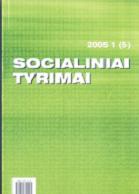Komandinio darbo ir organizacijos klimato sąryšio ypatumai
Peculiarities of the Link Between Teamwork and the Internal Enviroment of the Organization
Author(s): Ineta Beniušienė, Gediminas Merkys, Jolita Vveinhardt, Mykolas DromantasSubject(s): Social Sciences
Published by: VšĮ Šiaulių universiteto leidykla
Keywords: Teamwork; climate of the organization.
Summary/Abstract: An organisation can perform effectively and reach the common goals only if it has organised a perfectly acting team, the performance of which is determined by a favourable climate. However, this is a complex process, which requires a lot of knowledge and skills. The benefit of teamwork and favourable climate is manifested in the improvement of work quality and its output, communication, dissemination of information and interpersonal relations. In scientific literature on management and organisational psychology, teamwork and organisational climate are characterised as important phenomena of organisational human resource management and areas of research. The data of the research, based on the joint sample (N = 810), show that the teamwork test created by Ger-man scientists and then adapted and a new test of organ-isational climate crisis can pretend to the highest evalua-tion of their psychometric quality. Under the conditions of organisational culture of our country the tests men-tioned above proved to be valid and reliable tools for diagnosing the state of the human resource. Correlation relations between teamwork and or-ganisational climate manifest themselves systematically and are statistically reliable. This shows that these pa-rameters of human resource management are interrelated. Thus, the rule that usually favourable organisational cli-mate corresponds to effective teamwork and vice versa stands. It is possible to hypothesise that a favourable organisational climate is the prerequisite of effective teamwork. If organisational climate in teams is critical, the effective work in teams is less likely. Analysing the data of the joint sample it was no-ticed that the gender of employees doesn’t influence nei-ther the effectiveness of teamwork, nor the evaluation of the crisis in organisational climate. These parameters are especially influenced by the status of an employee: the team leaders are subject to evaluate these parameters more favourably than ordinary employees. It was also noticed that there is a tendency that the employees who have worked in a company for a longer time tend to evaluate organisational climate and teamwork more fa-vourably than those who have worked for a shorter pe-riod. This tendency is not expressed strongly, but it is statistically reliable.
Journal: Socialiniai tyrimai
- Issue Year: 2005
- Issue No: 5
- Page Range: 38-45
- Page Count: 8
- Language: Lithuanian

